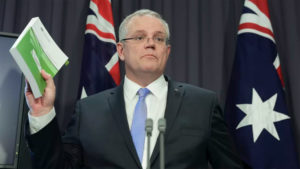Home » Commentary » Opinion » Smaller states should demand more… but not from the GST
· The Sydney Morning Herald

 It’s has been billed as the biggest change to the GST in two decades.
It’s has been billed as the biggest change to the GST in two decades.
The federal government has moved quickly to resolve the very low GST relativity of Western Australia after a mere half decade of payments below 50 cents in the dollar. This problem will be completely fixed, Treasurer Scott Morrison assures us, as soon as 2026-27.
With all due respect to the fiscal struggles of the Western Australians — some of which are self-inflicted and unrelated to the GST distribution — their recent situation is something of an outlier. Having a relatively small but dispersed population for such a large land mass, with a volatile income base seeing a massive temporary boom, the calculation of GST shares for the other states off the WA case was always going to cause anomalies.
That said, a situation where they effectively received such a low share of the GST income raised in their own state was never sustainable. It should not have gone on as long as it has, especially given the GST in part replaced state taxes that were wholly retained within the state.
The Treasurer’s supposedly substantial reform of the GST will see the creation of a minimum relativity floor of 70 cents in the dollar, rising eventually to 75 cents. Going forward, the benchmark for redistribution will be NSW and Victoria, rather than simply the strongest state. This is a positive move and will remove future volatility.
The reform will also involve the addition of more than $7 billion of extra funds to ensure no state is worse off … because heaven forfend that a sovereign state government be responsible for managing its own fiscal affairs.
Mr Morrison claimed on Thursday that the GST distribution is broken. While slightly hyperbolic, there is some truth to this claim. However, while the low GST share of WA is a problem, it’s not the major problem with the GST redistribution. The major problem is the attitude it has entrenched in states like South Australia and Tasmania.
Specifically, it’s the belief that the responsibility to manage the fiscal position of South Australia and Tasmania — to raise money and improve services — lies primarily with the Commonwealth and larger states like NSW and Victoria. Everywhere but at home.
For some time, whenever there is a problem in South Australia, or a federal or state election, the first response of the SA Premier has been to demand the Commonwealth hand over more and more cash.
That is not horizontal equalisation, it’s an abrogation of state responsibility and sovereignty.
The response to the proposal of a state income tax was very illustrative. The states have long been complaining about the situation where the Commonwealth raises the bulk of the revenue, and the states deliver the bulk of the services. It has been a problem in our federation for some time and the dtates are right to want to fix it.
The difficulty is the most obvious fix is for the dtates to raise more of their own revenue. The Commonwealth should raise less, and redistribute less to the dtates, and the dtates should raise more to spend on their priorities as they see fit.
But the state Treasurers didn’t want a bar of the split income tax solution. No, their preferred method was for the Commonwealth to take the hit: to raise more revenue and hand it straight to the states, with less accountability while you are at it, please and thank you.
Mr Morrison’s GST fix is a band aid on this bigger problem. Indeed, the fact that the Commonwealth has to spend more overall to solve the WA issue is some ways actually reinforces the ‘feds should fix it’ approach.
It may well be that the politics of fixing the federation are too hard. However, while NSW and Victoria are being short-changed in the short term compared to a per capita distribution of the GST, in the longer term it’s South Australians and Tasmanians who will suffer. They will be forever dependent on the charity of others for their standard of living.
There is little doubt that states like NSW and Victoria are relatively richer than South Australia and Tasmania, and so have certain advantages. But there is no reason why a good, reforming state government can’t bridge that gap.
Rather than demanding the Commonwealth spend more to bring them up to average, why shouldn’t SA and Tasmania strive to top the country? Are they implying that their states can never be as good as NSW or Victoria? That they’ll always need a handout?
There is definitely a case for some horizontal equalisation, but for a good government it should only ever be temporary. And it shouldn’t come at the permanent expense of state sovereignty.
Simon Cowan is Research Director at The Centre for Independent Studies.
Smaller states should demand more… but not from the GST